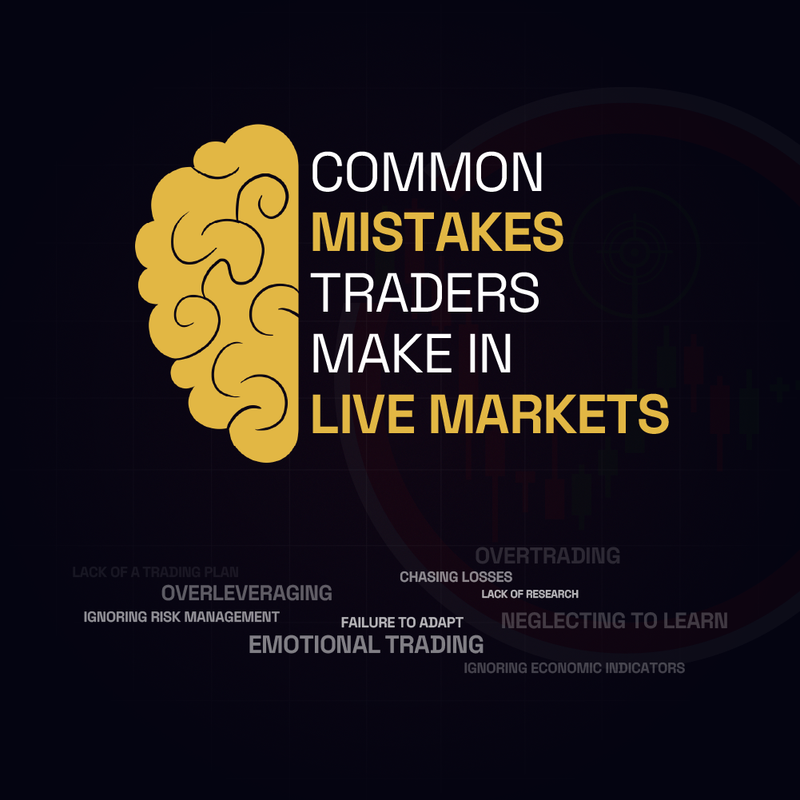Trading in live markets presents numerous opportunities but also significant challenges. Many traders fall into common pitfalls that can jeopardize their success. Understanding these mistakes and how to avoid them is crucial for long-term profitability in trading.

1. Lack of a Trading Plan
Trading without a well-defined plan often results in inconsistent execution and emotional decision-making. A trading plan acts as a roadmap, detailing specific entry and exit strategies, risk management protocols, and financial goals. Without it, traders are more likely to second-guess their actions and make impulsive moves.
- - Clearly define your trading strategy and write it down.
- - Include criteria for trade entries and exits, as well as risk-reward ratios.
- - Periodically review and update your plan to reflect market changes and personal learning.
2. Overleveraging
Leverage can increase buying power, allowing control of larger positions with less capital, but it significantly magnifies both gains and losses. Over-leveraging can lead to rapid depletion of account equity, as even small adverse market movements are amplified.
- - Understand the risk dynamics of leverage and use it responsibly.
- - Opt for leverage ratios that align with your risk tolerance and trading plan.
- - Regularly assess your leverage exposure to ensure it remains within manageable limits.
3. Ignoring Risk Management
Ignoring or inadequately considering risk management can transform small losses into substantial financial setbacks. Effective risk management protects capital and ensures the sustainability of your trading account. It involves determining acceptable risk per trade and using tools like stop-loss orders.
- - Calculate the maximum percentage of capital you’re willing to risk on each trade.
- - Use stop-loss orders to enforce discipline and limit potential losses.
- - Diversify your trading positions to mitigate risks associated with single trades.
4. Emotional Trading
- - Description: Emotions such as fear, greed, and hope can influence traders to deviate from their strategies, often leading to suboptimal outcomes. Emotional trading undermines logical decision-making, resulting in reactive rather than proactive trading actions.
- - Recognize emotional triggers and develop techniques to manage them, such as stress-relief practices.
- - Stick to your trading plan and avoid making decisions based on emotion.
- - Build emotional resilience by regularly reviewing past trades to learn from emotional decision points.
5. Failure to Adapt
The dynamic nature of financial markets means that conditions can change rapidly. Sticking to outdated strategies or failing to recognize market shifts can lead to losses. Successful traders continuously adapt their techniques to align with current market environments.
- - Stay informed about global financial news and market trends.
- - Be open to altering your strategies as market conditions evolve.
- - Test and refine new trading strategies using technology like backtesting.
6. Overtrading
Attempting to make too many trades, often in pursuit of rapid profit or to recover losses, can lead to high transaction costs and increased exposure to risk. Overtrading often results from hyperactive market engagement without substantive analysis.
- - Set daily or weekly trading limits to prevent overtrading.
- - Prioritize quality over quantity by focusing on well-researched trades.
- - Analyze trading outcomes to recognize patterns of overtrading.
7. Chasing Losses
This involves making impulsive trades in an effort to quickly recover from a loss, usually exacerbating the original loss instead. This behavior often leads to a cycle of compounding errors and escalating financial damage.
- - Acknowledge and accept losses as a natural part of trading.
- - Stay focused on long-term trading goals rather than short-term recovery.
- - Reassess your trading strategy if you find yourself frequently chasing losses.
8. Lack of Research
Making uninformed trades due to a lack of thorough market research or ignorance of broader economic factors leads to unexpected outcomes. Well-informed trading decisions are based on detailed analysis and a comprehensive understanding of market dynamics.
- - Conduct comprehensive research, including technical and fundamental analysis, before executing trades.
- - Stay updated with real-time news, financial reports, and market analyses.
- - Use analytical tools and platforms to gain deeper insights into market trends.
9. Neglecting to Learn
Failing to learn from past trading experiences hinders personal growth and the development of effective trading skills. Continuous learning and reflection enable traders to refine their approaches and improve future performance.
- - Maintain a detailed trading journal and review it regularly to analyze successes and failures.
- - Invest time in education through courses, webinars, and books on trading.
- - Seek feedback and insights from experienced traders to enhance your skills.
10. Ignoring Economic Indicators
Overlooking significant economic data and events, such as inflation rates, employment figures, and central bank announcements, can lead to uninformed trading decisions. These indicators often drive market movements and can impact asset pricing.
- - Regularly follow economic calendars to be aware of upcoming data releases.
- - Incorporate economic indicators into your market analysis.
- - Understand how different economic reports can affect the markets you trade in.
Don't miss your chance to be part of our trading community that supports your journey to trading success!
👉 Master Price Action: Start Your SST Journey
Keep an eye on the markets and happy trading!

